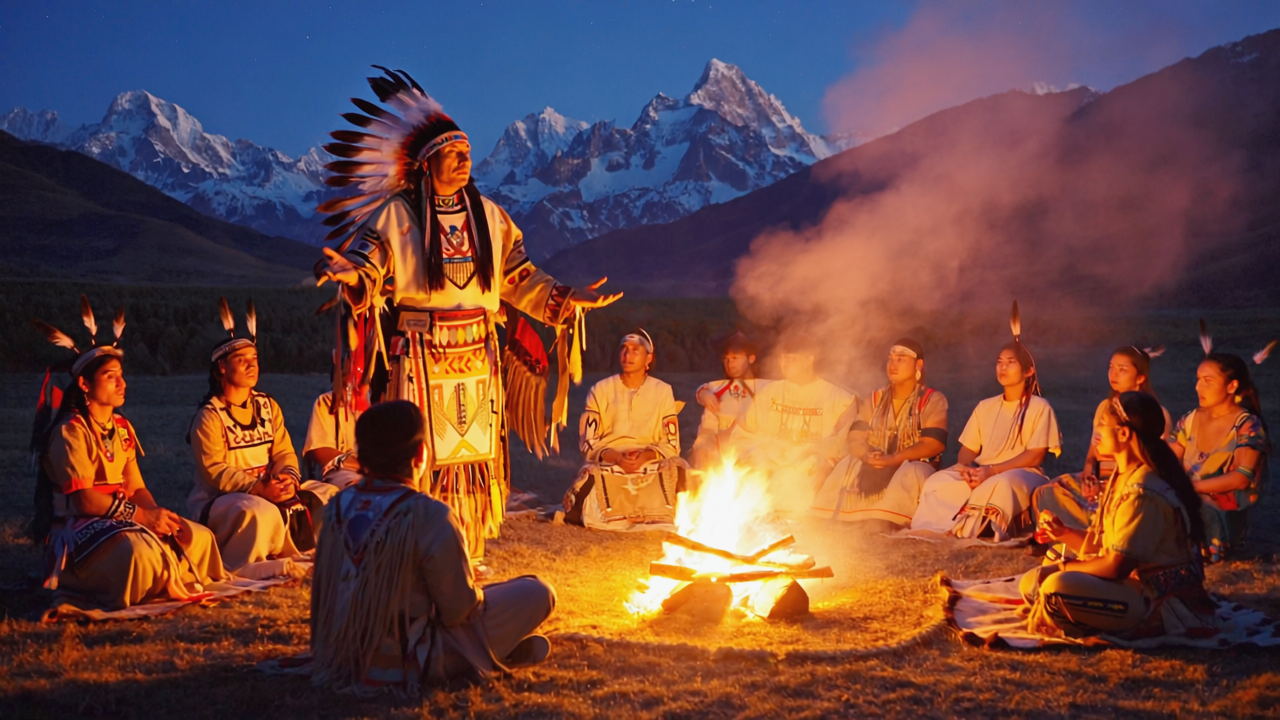Religious Tolerance VS Religious Acceptance

Listen to the speech
Watch a video of the speech
This speech is inspired by Shri Rajiv Malhotra’s book “Being Different” as well as his writings and discussions on religious tolerance versus religious acceptance.[1]
I recall sitting with my housekeeper, Gordana, during one warm evening in Belgrade as she reminisced about her youth in Yugoslavia. She remembered fondly that she always got to celebrate Christmas twice – once on January 7th as is the tradition with Orthodox Serbs, and once on December 25th, with her Catholic Croat friends. But it didn’t stop with Christmas – she also remembered going to her Muslim friend’s house to celebrate Bajram[2] at the end of the Ramazan[3] month.
This was the norm in Yugoslavia. Each ethnoreligious group celebrated their own festivals as well as that of their neighbors. Serbian, Croatian, and Bosniak culture was celebrated. Orthodox Christianity, Catholicism, and Islam all had their place. But above all, the people were Yugoslavs and under this unity, they had a strong, industrious, and robust nation – one that could stand up to both the West and the Soviet Union.
But alas, this religious tolerance wouldn’t last forever – and the breakup of Yugoslavia didn’t just see the breakup of a nation, and the horrific bloodshed that ensued. It also meant that the religious fluidity that brought the society together, would become less common.
Yugoslavia was lauded for its religious tolerance, as any successful multi-faith country is. But tolerance, simply wasn’t good enough. As Gordana smoked her cigarette and drank her coffee, she dreamt about a past that she wished would have continued to the present.
In the civilized multi-faith countries of the world, we see cooperation among people of different faiths - as they work to improve and build their societies. Conversely, and with deep sadness, we see other nations where religions fight each other.
Sometimes there are several competing religions, all fighting for dominance. Other times, there are one or two religions that seek to destroy the others - and in response, the followers of all other religions assert their religious identity above the national identity, seeing it as the only way to protect their faith.
The latter nations are those that have high levels of religious intolerance - something that the civilized nations of the world rightfully reject.
However, the civilized nations of the world also have a flaw. While they are not intolerant, they are tolerant. And while religious tolerance is better, it is not the ideal. It is a stepping-stone and it should not be the final destination.
Religious tolerance does not lead to more social harmony. Religious tolerance is just one step away from a holy war in which the most unholy and unspeakable crimes against humanity are inevitable. So many multi-faith nations today boast about having religious tolerance – but if tolerance is the best one can do, then our aspirations are low – and are beyond pathetic.
I ask you: if a husband and wife tolerate each other, is that marriage going to last?
We all know, it will not. The husband and wife who tolerate each other – don’t love each other. They hate each other and are just putting up with each other for whatever reason. Conflict may not occur, but the threat of conflict is always lingering.
What happens in a multi-faith society, if we simply tolerate each other's religion? We'll tolerate each other…until we don't. We'll put up with each other…until we've decided we've had enough of each other.
The only way out is to get out of this barbaric cultish mentality that we are right, and that the other man needs to change his ways. The reality is that all of us are right about some things and wrong about others.
As Swami Vivekananda proclaimed at the Parliament of Religions, “every system has produced men and women of the most exalted character.”[4] This is absolutely true and we must celebrate the beauty in each religion.
Equally, we must introspect on each religion and realize that none is above reform. None is above criticism and no scripture should be above questioning, reform, and outright rejection. Contrary to popular belief, you do not have all the answers and your neighbor who thinks differently isn’t the bloody fool you imagine him to be. There is wisdom in both of you, and downright stupidity in both of you.
Religions will always continue to exist and the continuation of different religions, sects, and the birth of new religions will continue be the norm. In other words, we have to learn to co-exist lest our humanity ceases to exist. The only way forward is to move beyond religious tolerance and follow religious acceptance.
Already, most religions are capable of this. The only major civilization that has shown the way is the Dharmic Civilization, born in Bharat, better known as India to most of the world today. India is the birthplace of four major religions: Hinduism, Buddhism, Jainism, and Sikhism. All have commonalities and differences - yet what they are all firm on is mutual respect.
My traditions may differ from my neighbor's, but he is not wrong. I don’t just tolerate him; I accept him. I recognize that both he and I are capable of reaching the Divine, regardless of the path we take. Just as his path may have flaws that need fixing, I am not arrogant enough to believe that my path is perfectly carved out or that there are no potholes needing attention! That is how multi-faith societies should think.
Too often, we see religion as a means to help us believe. Rather, it should be a means to help us seek. Let us explore each other’s faiths, scriptures, and festivals, and choose our own path to reaching the truth. Let us ACCEPT, not TOLERATE, that while our neighbor may choose a different path, he does so with the same sincerity and conviction as we do.
How different the world would have been, had the tyrant Aurangzeb not ordered the beheading of his own brother Dara Shikoh? Dara Shikoh authored The Confluence of the Two Seas[5] in which he aimed to explore the beauty and wisdom of the Sufic and Vedic worldviews. It was a call for pluralism, in an Ancient India where Hindus, Buddhists, Jains, and Sikhs where fighting for their survival, from the tyrannical Mughal rulers.
What the future of the Indian Subcontinent would have been like had Dara Shikoh’s message and call for pluralism and religious harmony been heard is one that historians and ordinary citizens alike have pondered time and time again. Sadly, Aurangzeb’s tolerance for his brother ran out.
When the barricade of tolerance breaks, intolerance charges in and wreaks havoc. Aurangzeb charged Dara Shikoh with apostasy…and had him executed. In the name of reaching Heaven, Aurangzeb unleashed a hell – one that no one from the Indian Subcontinent today can forget.
Rather than seeing those who think differently as enemies who are against us, we need to understand that their path is different, but OUR destination is the same.
But to those who reject this idea, and who won’t rise above tolerance – you are hostile to the idea of a cohesive multi-faith society. YOU see yourself as part of the solution, but it is you and others of your ilk, who are responsible for the problem.
If you live in a multi-faith society, and your religion pits you against your fellow citizens, causing you to see them as your enemies, rather than those with whom you must have allegiance to, then your religion must evolve.
Your country comes first. This is non-negotiable for any multi-faith country.
To those who reject this idea, don’t tremble when your society turns against you and scorns you. The animosity you will face is an animosity you have asked for – you will have no one to blame but yourself.
Whether you like it or not, the days of exclusivism are gone. Pluralism is here to stay. Each multi-faith nation can be based on the values of one religion – but must find a way to accommodate others. Likewise, minority religions that are treated with respect must also give respect to the majority religion. Respect is a two-way street. Respect those who respect you.
If you fight those who respect you, you will be showered with constant disrespect, and no umbrella will protect you. If you cannot cultivate mutual respect, then you are unworthy of being treated with kindness, politeness, and dignity.
The Pakistani Army Chief Asim Munir proudly and foolishly boasts about the Two-Nation Theory and scorns the Hindus – both in India and in his own country.[6] What has Pakistan gained from fighting against religious pluralism? A weak passport, a haven for terrorism, and a begging bowl for food and water. Well done!
What happened to the Catholics and Protestants in Northern Ireland who have chosen to live apart and are hostile toward each other? What have they lost? Thousands of lives. What have they gained? Not a bloody thing!
The great Lee Kuan Yew turned Singapore from the Slum of Asia to one of the most successful countries, not just because of his economic policies.
He also recognized that the Singaporean identity had to go beyond race and religion. As he explained, you may call someone else’s God a superstition, but if they have given succor and comfort for successive generations, then who are you to say your holy book isn’t superstition?[7]
In this world of religious pluralism that we must seek to build, we must also create a space for agnostics and atheists. Just as the believer must have a space to believe, the agnostic must have a space to question, and the atheist must have a space to reject. Those who do not consider themselves believers are also seeking to understand the universe's intricacies, the purpose of life, and how we can all be more moral.
Religion is a path, and so is irreligion.
The believer must have room for doubt. The non-believer must have room to reconsider his or her beliefs.
There is no one path that everyone must follow.
Instead, we must have an infinite number of paths available to us, and none of us should be attacked should we choose to change course – as our destination will always be the same.
If we work toward a world where we accommodate different paths, we are working toward a more civilized world.
We must also reopen paths that have been closed. May Europe, Asia, Oceania, and Africa rediscover their ancient religions. May The New World rediscover the Old Gods. May the dream of Chief Red Jacket come true.[8] May those religions that have given up the sacred Swastika, reclaim it with pride. This is the way forward.
However, if we continue to cut off as many paths as possible, in the hope that only our path will survive, may the Divine turn away from us – and give us the punishment we deserve and have brought upon ourselves.
Speech (excluding quotes) is Copyright 2025 Raghav Suri. All Rights Reserved.
Speech published on June 8, 2025
Audio Narration by Ram Ranjini published on June 14, 2025
Video by Raghav Suri published on June 16, 2025
Notes
[1] Rajiv Malhotra – Tolerance Isn’t Good Enough – The Need for Mutual Respect
[2] Bajram is the name for Eid-al-Fitr in Serbia and in Bosnia and Herzegovina
[3] Ramazan is the name for Ramadan in Serbia and in Bosnia and Herzegovina
[4] Swami Vivekananda – Addresses at the Parliament of Religions (pg.16)
[5] Majma Ul Bahrain (The Confluence of the Two Seas ; Mingling of Two Oceans)
[6] Asim Munir’s Speech (1m59s-2m35s – is the reference I used for this section on Pakistan)
[7] Lee Kuan Yew – Speech on Religious Tolerance in Singapore (6m-6m24s – is the reference I used for this section on Singapore)



